Planning a road trip with your 30 Amp RV? The right size generator can make or break your adventure.
We break down the essentials, from wattage to fuel type, ensuring you have reliable power on the go. Say goodbye to electrical woes and hello to a smooth journey.
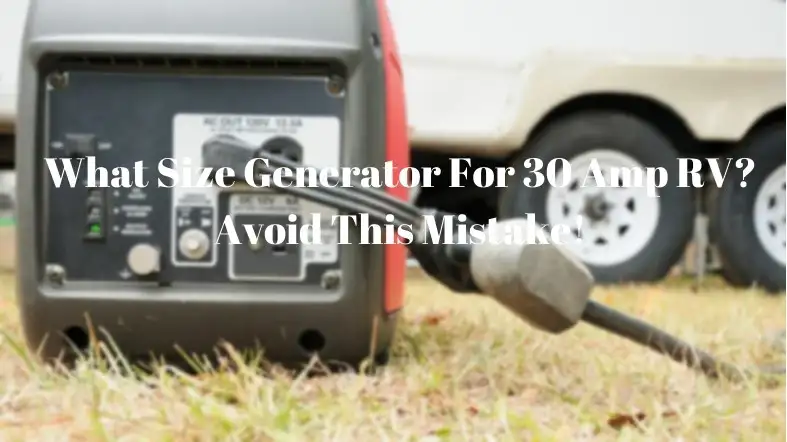
Click Here To Check Recommended Generators
What Size Generator For 30 Amp RV?
For a 30 Amp RV, a generator size between 3,600 to 4,000 watts is generally recommended. This ensures adequate power for air conditioning, appliances, and other electrical needs. Always consider the specific power requirements of your RV’s equipment for optimal functionality.
Here is a table showing generator sizes needed for different RV types:
| RV Type | AC Units | Generator Size |
|---|---|---|
| Class B Van | 1 | 2,000 to 3,600 watts |
| Class C RV | 1 | 2,800 to 4,000 watts |
| Class A RV | 2 | 5,500 to 8,000 watts |
| Class A RV | 3 | 10,000 to 12,500 watts |
| Fifth wheel | 2 | 5,500 to 7,000 watts |
30 AMP RV Ready 4 Best Generators (Choose According To Your Needs)
1. Champion Power Equipment 3500-Watt Inverter Generator
2. MaXpeedingrods RV Ready 5500W Inverter Generator
3. DuroMax 8500 Watt Gas RV Ready Portable Generator
4. Westinghouse 12500 Peak Watt Dual Fuel RV Ready Generator
How To Calculate The Generator Size For A 30 Amp RV?
Calculating the right generator size for a 30 Amp RV involves multiple steps, taking into account both your power needs and the type of generator you’re considering.
Here’s how to go about it:
Step 1: Determine Your Power Needs
- Identify Essential Appliances: Make a list of all the electrical appliances and devices you’ll be using in your RV.
- Check Their Wattage: Check the wattage of each appliance; you can usually find this information on the appliance’s label or in its manual. If the information is given in amps, you can convert it to watts using the formula:
Watts = Amps x Volts. For a typical RV setup running on 120 volts, the formula would beWatts = Amps x 120. - Calculate Total Wattage: Add up the wattage of all the appliances you plan to run simultaneously (or you can use our free wattage calculator for the generator).
Step 2: Consider Starting and Running Wattage
Electrical devices often need more power to start than to run. This is called “starting wattage” or “peak wattage,” while the power needed to run the device is called “running wattage.”
- Identify Appliances with High Starting Wattage: Appliances like air conditioners and refrigerators have high starting wattages.
- Calculate Total Starting Wattage: Add the highest starting wattage to the running wattage of all other appliances you plan to run simultaneously.
Step 3: Add a Buffer
It’s a good idea to add a buffer to accommodate unexpected power needs or inaccuracies in your calculations.
- Buffer: Add about 20-25% to your total starting wattage. This ensures you have some extra power, just in case.
Step 4: Choose the Generator
Select a generator that meets or exceeds the total starting wattage you’ve calculated, including the buffer.
Make sure it’s compatible with a 30 Amp RV electrical system, usually requiring an appropriate 30 Amp outlet (typically a TT-30R receptacle).
Example Calculation
- Essential Appliances: Air conditioner (15,000 BTU), Refrigerator, Microwave, TV, and Lights
- Air conditioner: 2000W running, 4000W starting
- Refrigerator: 150W running, 300W starting
- Microwave: 1000W running
- TV: 150W running
- Lights: 100W running
- Total Running Wattage: 2000W (A/C) + 150W (Fridge) + 1000W (Microwave) + 150W (TV) + 100W (Lights) = 4400W
- Total Starting Wattage: 4000W (A/C starting) + 150W (Fridge) + 1000W (Microwave) + 150W (TV) + 100W (Lights) = 5400W
- Buffer: 5400W * 1.25 (25% extra) = 6750W
In this example, you’d need a generator capable of supplying at least 6750W of starting wattage, with a running wattage capacity that exceeds 4400W. Also, make sure the generator has a 30 Amp RV outlet.
30 AMP RV Ready 4 Best Generators (Choose According To Your Needs)
1. Champion Power Equipment 3500-Watt Inverter Generator
2. MaXpeedingrods RV Ready 5500W Inverter Generator
3. DuroMax 8500 Watt Gas RV Ready Portable Generator
4. Westinghouse 12500 Peak Watt Dual Fuel RV Ready Generator
Here is a range of appliances and electronic devices you might use in a 30 Amp RV. Remember, wattages are approximate and may vary by model or brand.
| Appliance | Starting Wattage | Running Wattage |
|---|---|---|
| Air Conditioner (13,500 BTU) | 2,800 – 3,000 W | 1,800 – 2,000 W |
| Refrigerator | 600 – 1,200 W | 150 – 200 W |
| Microwave | 1,000 – 1,200 W | 600 – 1,000 W |
| Coffee Maker | 600 – 1,200 W | 600 – 1,200 W |
| Electric Grill | 1,500 – 2,000 W | 1,500 – 2,000 W |
| TV (LED) | 200 – 400 W | 150 – 300 W |
| Laptop | 200 – 250 W | 50 – 100 W |
| Hair Dryer | 1,800 – 2,000 W | 1,800 – 2,000 W |
| Electric Heater | 1,500 – 2,000 W | 1,300 – 1,500 W |
| Water Heater | 3,000 – 4,500 W | 3,000 – 4,500 W |
| Vacuum Cleaner | 500 – 1,500 W | 500 – 1,000 W |
| Electric Cooktop | 1,500 – 2,000 W | 1,500 – 2,000 W |
| Blender | 300 – 1,000 W | 300 – 600 W |
| Toaster | 800 – 1,500 W | 800 – 1,500 W |
| Slow Cooker | 200 – 300 W | 200 – 300 W |
| Electric Kettle | 1,500 – 1,800 W | 1,500 – 1,800 W |
| Exhaust Fan | 30 – 50 W | 30 – 50 W |
| Portable Fan | 50 – 100 W | 50 – 100 W |
| Radio | 50 – 100 W | 50 – 100 W |
| Iron | 1,000 – 1,800 W | 1,000 – 1,800 W |
| Washer/Dryer Combo | 1,500 – 2,000 W | 1,000 – 1,500 W |
| Electric Oven | 2,000 – 5,000 W | 2,000 – 5,000 W |
| Dishwasher | 1,200 – 1,500 W | 1,200 – 1,500 W |
| Air Pump | 50 – 100 W | 50 – 100 W |
| CPAP Machine | 30 – 50 W | 30 – 50 W |
| Gaming Console | 100 – 200 W | 100 – 200 W |
| Smartphone Charger | 5 – 10 W | 5 – 10 W |
| Tablet Charger | 10 – 20 W | 10 – 20 W |
What Appliances Can A 30 Amp RV Power?
A 30 Amp RV can typically power the following appliances:
- Air Conditioner (1 unit)
- Refrigerator
- Microwave Oven
- Electric Stove or Cooktop
- Water Heater
- Television
- Lights
- Laptop/Phone Chargers
- Small Kitchen Appliances (e.g., Coffee Maker, Toaster)
- Electric Fan
How Many Watts Does A 30 Amp RV Generator Produce?
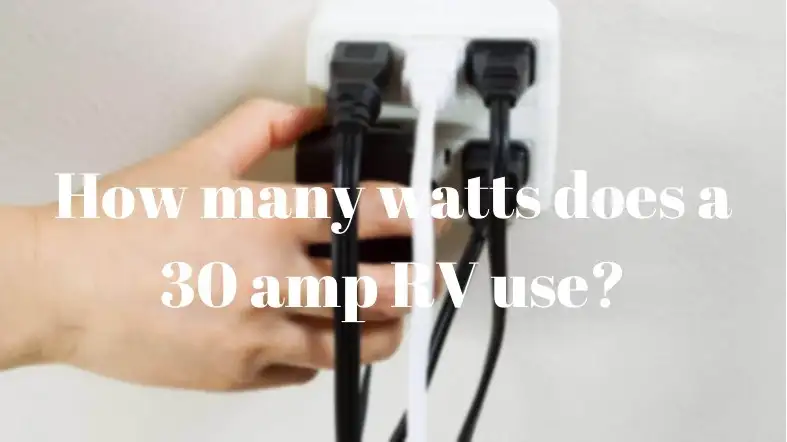
A 30 Amp RV generator usually produces between 3,600 to 4,000 watts of power. This is generally sufficient to operate an air conditioner, lights, and small appliances like a microwave or TV. Always refer to your specific RV’s electrical requirements to ensure the generator is adequate.
Types of Generators You Can Use for a 30 Amp RV
There are four main types of generators that you can use for a 30 amp RV. They are,
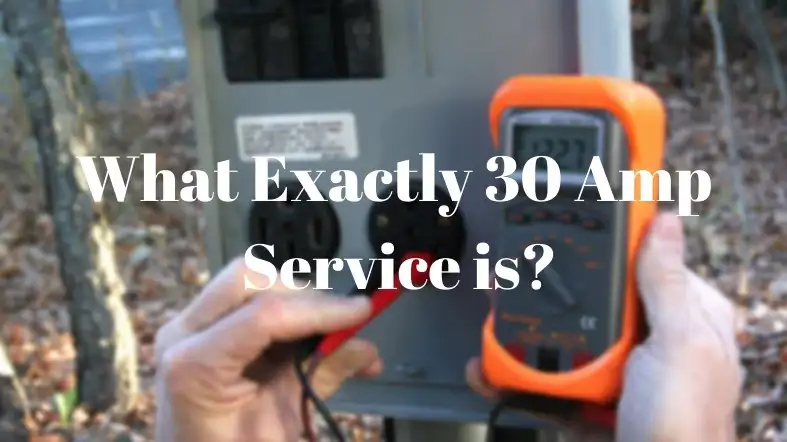
Portable Generators
Portable generators are the most common and affordable type of generators for RVs. They are easy to move around and store, and they can run on gasoline or diesel fuel.
They also have some drawbacks. They are usually noisy, heavy, and require frequent refueling and maintenance.
They also produce dirty power that can damage sensitive electronics.
Inverter Generators
Inverter generators are a newer and more advanced type of generators for RVs. They are quieter, lighter, and more fuel-efficient than portable generators.
They also produce clean power that is safe for electronics. They are also more expensive and have lower power output than portable generators.
Standby Generators
Standby generators are permanent generators that are installed in your RV or at your campsite.
They are connected to a fuel source such as natural gas or propane, and they automatically turn on when the power goes out.
They are very convenient and reliable, but they are also very costly and require professional installation and maintenance.
Dual-Fuel Generators
Dual-fuel generators are generators that can run on two different types of fuel: gasoline or propane. They offer more flexibility and versatility than single-fuel generators.
They can also save you money and reduce emissions by switching to propane when gasoline is scarce or expensive.
They are also more complex and require more care than single-fuel generators.
>> What size generator to operate a microwave?
What to Look for in a 30 amp Generator?
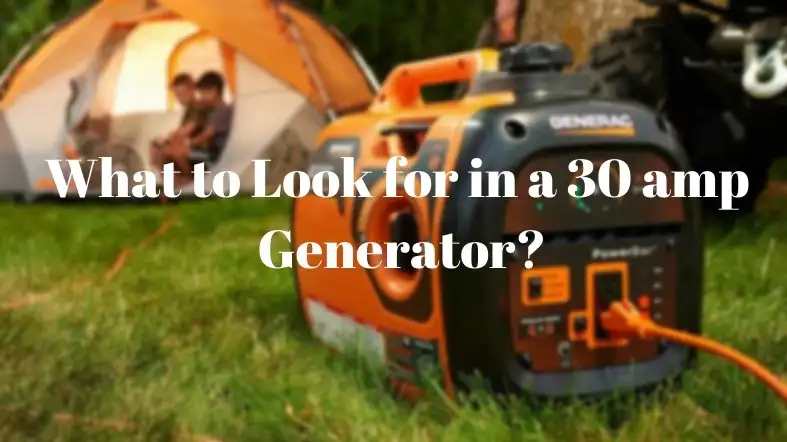
The following step-by-step guide will walk through what you should consider before purchasing a generator system model that won’t disappoint:
1. Wattage of Generator:
The wattage of the generator will determine how much power it can provide in an hour.
The higher the wattage, the more power that is generated and this may be necessary for powering your appliances as well as running a few small tools.
2. Generator Noise Level:
The sound level of a generator is measured in decibels.
Anything below 55 dB is acceptable for residential use, while anything over that can be too loud to sleep near or hear the conversation with the person next to you.
3. Portability:
Some 30 amp RV generators are light and easy to move.
Some can be mounted onto a hitch for use with your vehicle, while others have wheels that allow them to be maneuvered easily from place to place on the campsite or job site.
>> What size generator to power a space heater?
4. Ease of Installation:
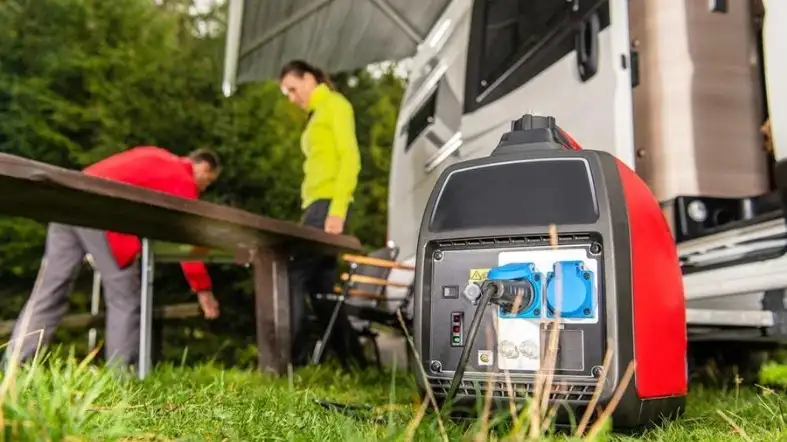
Most portable models will come complete with all the necessary hardware needed for installation.
If you’re purchasing an RV generator system as a stand-alone model, the assembly will be required.
5. Power:
Most models are designed to power the appliances that can come with your camper or trailer like TVs, DVD players, and lights.
They may not have enough running wattage for other things like air conditioners, microwaves, electric ovens, etc.
6. Fuel Type:
Some generators use gas to produce power, while others utilize propane or natural gas fuel sources.
Propane is the fuel of choice for many RV generators. It is widely available and easy to use, but it can also be expensive if you have a long stay at your destination.
>> What generator size to power refrigerator and freezer?
7. Parallel Capability:
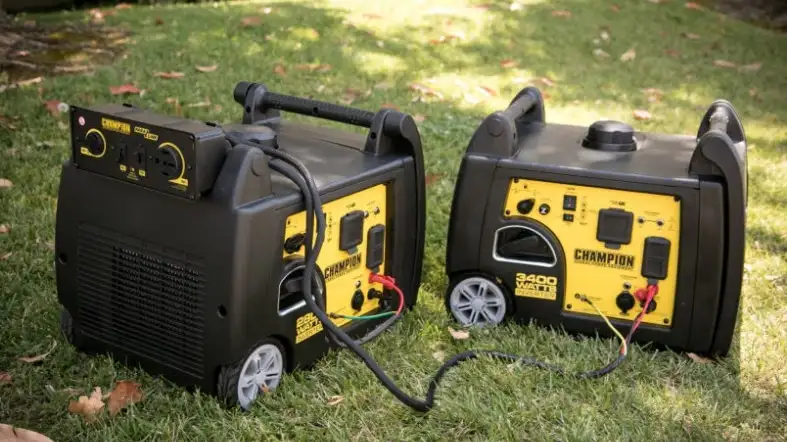
Some generators can run on the same circuit as other appliances. This is a key feature to consider, especially if you are limited in space with your camper or trailer.
8. Cost:
There are a wide variety of prices depending on the size and features you’re looking for in your generator.
Online retailers will offer competitive pricing when purchasing directly from them. Beware of inflated costs by dealers that may be present at some big-box retailers.
9. Economy Mode:
This is the speed at which a generator works. This mode should be used for low-demand activities such as watching TV, charging electronics, etc.
Low Mode:
A great power saving option to use when running appliances in your RV after you have shut down the engine and turned off anything not being used inside of it.
The low mode will still operate at a fast enough speed to cool down the generator, but it will use less fuel.
High Mode:
The most powerful mode on your generator and should be used for appliances that need more power such as an electric oven or stovetop burners, clothes dryer, air conditioner/heater unit, etc.,
Turbo mode:
A great power saving option to use when running appliances in your RV after you have shut down the engine and turned off anything not being used inside of it.
The low mode will still operate at a fast enough speed to cool down the generator, but it will use less fuel.
>> What size generator to power a space heater?
10. Fuel Efficiency:
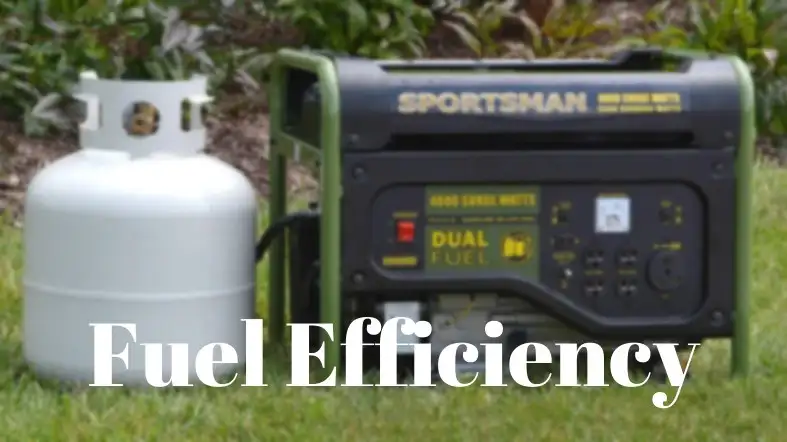
Fuel efficiency is your top priority. You want to make sure that you have enough fuel on hand, and the generator needs to be able to use what it has efficiently.
11. Generator Cover:
Protect your generator from the elements. It will be stored outside and exposed to rain, snow, dust, dirt, and other debris that can cause more damage over time.
A cover should have plenty of ventilation so it doesn’t trap moisture inside.
12. Aesthetics:
When generators are not in use they can easily become an eyesore if their unattractive design takes away from your landscape.
As a rule of thumb, try to find a generator that is either portable or comes with wheels to make it easy for you to store when not in use.
How Much Power Do You Need With AC?
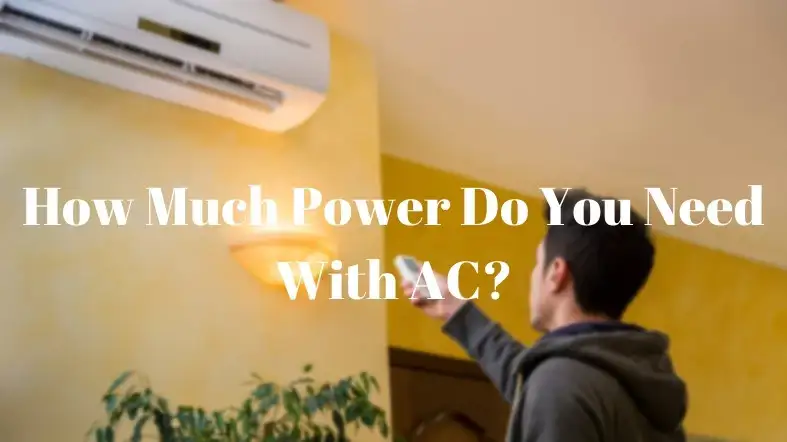
A typical 30 amp RV has a draw of 11.0 amps, which is about 3600 watts (36 kW).
A full load with the AC running will be around 13-15 amps or 4000-5000 watts (40 – 50 kW) and an idle load at night would be around 0.25 to 0.75 amps or 300-1500 watts (0.30 – 0.90 kW).
How Do You Hook Up A Generator To A 30 Amp RV?
A 30 amp RV plug will connect to a generator with an adapter. You’ll need at least a 25-amp circuit breaker for the generator and two 20-amp outlet circuits, one for each 120-volt receptacle on the RV.
One of these outlets can be shared among multiple appliances or electronics as long as they don’t exceed their power requirements.
The items you plug in will need the same amps and voltage as your RV. For example, a laptop that needs 20 volts at 13 amps can be plugged into an outlet on the RV.
But if it’s connected to 120v with 12 or 15 amp capacity, only one appliance is allowed per circuit. This means running the laptop will turn off the TV.
It’s a good idea to use one of your 20 amp circuits for power tools if you’re going to be running them.
Your RV is also equipped with 110 volt AC outlets and can use any adapter that fits into the 110 plugs on the generator cord.
Is a 30 amp RV plug 110 or 220?
In the United States, a typical 30-amp RV plug is designed for a 120-volt system. This type of plug has three prongs: a ground, a neutral, and a hot wire. It is often referred to as a “TT-30” plug, with the TT standing for “Travel Trailer.”
The plug is usually used to provide electrical power for moderate-sized RVs and travel trailers and is quite common at RV parks and campgrounds.
However, it’s essential to note that electrical standards can vary by country, so if you are dealing with RVs outside the United States, it would be a good idea to check the local standards.
Can I use a portable generator for my 30 amp RV?
Yes, you can use a portable generator to power your 30 amp RV. Just make sure that the generator you choose has enough power to run all of your appliances and electronics.
What is the difference between a portable generator and an inverter generator?
A portable generator is a conventional generator that runs on gasoline or diesel fuel and produces AC power. An inverter generator, on the other hand, uses advanced technology to produce cleaner and more stable power, making it suitable for powering sensitive electronics.
Do I need a generator if I have a 30 amp RV?
Having a generator is not a necessity for all RV owners, but it can be very useful in situations where you are camping without access to shore power or during a power outage.
Can I use a solar generator to power my 30 amp RV?
Yes, you can use a solar generator to power your 30 amp RV. However, you will need to ensure that the solar generator you choose has enough power to meet the demands of your RV appliances.
How quiet are RV generators?
RV generators come in a range of noise levels, but many modern generators are designed to be quiet. Look for a generator with a lower decibel rating if noise is a concern for you.
FAQs on What Size Generator For 30 Amp RV
Can I plug my 30-amp RV into a 50 amp Plug?
Yes, you can plug your 30-amp RV into a 50 amp Plug.
Can I Plug My 50 Amp RV Into a 30 Amp?
No. The difference in voltage is too great to be safe for the wiring and other equipment that’s connected, which will cause a power surge or worse.
Will a 3500-watt generator run a 30 amp camper?
A 3500-watt generator can power a 30 amp camper, but it may be slightly less efficient than a bigger one.
Is 30 amps enough for an RV?
It depends. It all depends on how much power you use in the RV and for what purposes (e.g., heating, air conditioner, lights).
Will A 2000 Watt Generator Run A 30 Amp Camper?
Yes, a 2000 watt generator can run a 30 amp camper.
Will a 4000 watt generator run a 30 amp RV?
Yes, a 4000 watt generator can run a 30 amp RV.
Can you run a 30 amp RV on a 20 amp generator?
Yes, you can run a 30 amp RV on a 20 amp generator by using an adapter.
Final Verdict
Hopefully, this article has helped you to understand the different features that come with generators and which size is best for your 30 amp RV.
If not or if you’re still unsure of what type of generator will work best for your needs, contact us today!
Our experts are ready and waiting to answer any questions about sizing generators.

